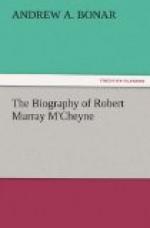It was about the same time, while still feeling the sadness of this bereavement, that he wrote the fragment entitled
“The righteous PERISHETH, and no man LAYETH it to heart.”
A grave I know
Where earthly
show
Is not—a
mound
Whose gentle round
Sustains the load
Of a fresh sod.
Its shape is rude,
And weeds intrude
Their yellow flowers—
In gayer bowers
Unknown.
The grass,
A tufted mass,
Is rank and strong,
Unsmoothed and
long.
No rosebud there
Embalms the air;
No lily chaste
Adorns the waste,
Nor daisy’s
head
Bedecks the bed.
No myrtles wave
Above that grave;
Unknown in life,
And far from strife,
He lived:—and
though
The magic flow
Of genius played
Around his head,
And he could weave
“The song
at eve,”
And touch the
heart,
With gentlest
art;
Or care beguile,
And draw the smile
Of peace from
those
Who wept their
woes
Yet when the love
Of Christ above
To guilty men
Was shown him—then
He left the joys
Of worldly noise,
And humbly laid
His drooping head
Nor heather-bell
Is there to tell
Of gentle friend
Who sought to
lend
A sweeter sleep
To him who deep
Beneath the ground
Repose has found.
No stone of woe
Is there to show
The name, or tell
How passing well
He loved his God,
And how he trod
The humble road
That leads through
sorrow
To a bright morrow
He sought the
breath:
But which can
give
The power to live—
Whose word alone
Can melt the stone,
Bid tumult cease,
And all be peace!
He sought not
now
To wreathe his
brow
With laurel bough.
He sought no more
To gather store
Of earthly lore,
Nor vainly strove
To share the love
Of heaven above,
With aught below
That earth can
show
The smile forsook
His cheek—his
look
Was cold and sad;
And even the glad
Return of morn,
When the ripe
corn
Waves o’er
the plains,
And simple swains
With joy prepare
The toil to share
Of harvest, brought
No lively thought
To him.




